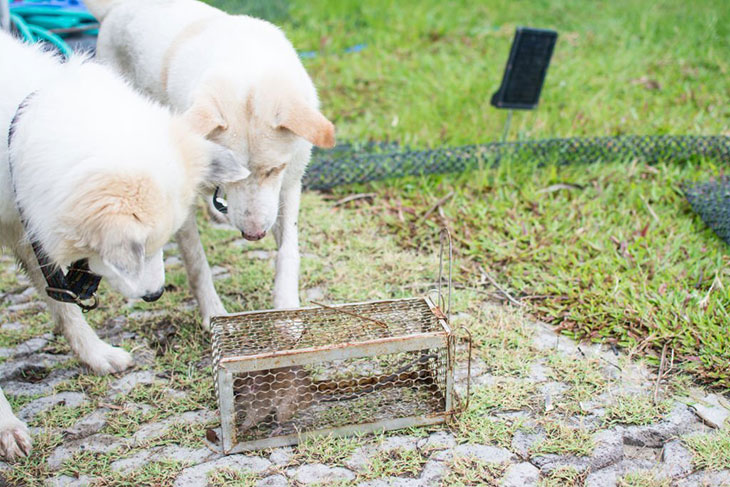The dog’s curious nature can sometimes get it into trouble, especially when encountering small rodents like mice. It’s natural to be concerned about the potential dangers that mice can pose to your dog, including the risk of bites. So, do mice bite dogs?
It’s essential to be aware of the potential dangers and take steps to protect your beloved animals.
In this article, we’ll explore why mice might behave like that to dogs, what to do if your dog is bitten, and how to prevent future encounters with these pesky rodents.
Common Concerns About Mice Biting Dogs
Many pet owners express concerns about the possibility of mice biting their dogs. While it’s true that mice are capable of biting, especially if they feel threatened or cornered, such incidents are relatively rare. Nonetheless, being aware of this possibility can help pet owners take appropriate preventive measures.
Can Mice Hurt Dogs by Biting?

Yes. Large animals like humans, dogs, and other similar beings inherently terrify mice. No typical mouse would desire to oppose a dog. But, mice can bite when they feel frightened, cornered, or ill.
Not to mention, through the mouse bite on dogs, a mouse can spread lots of diseases to your pets, such as the hantavirus, leptospirosis, tularemia, and many more.
Hence, to deter mice from entering your home and keep the pets safe, you must employ an efficient deterrence strategy.
What Diseases Can Mice Give to Dogs?
When a mouse bites a dog, there is a risk of transmitting various diseases and infections. Some common examples include leptospirosis, salmonellosis, and rat-bite fever. These illnesses can cause severe health issues in dogs and may require prompt veterinary attention. Understanding the potential risks is essential for taking preventive measures.
1. Intestinal Parasites
Your dog may become contaminated with intestinal worms like tapeworms, roundworms, and other parasites if it consumes infected rodents or is bitten by parasite carriers like mice.
Intestinal parasites can result in health-related problems like lethargy, vomiting, diarrhea, and weight loss as they eat the nutrients from your dog’s digestive tract.
2. Rat Poison
If a poisoned rat bites your dog, the pet can also get poisoned and can’t maintain its normal daily activities.
It can die from rat poison without a timely cure, thus necessitating immediate medical intervention.
3. Rat Bite Fever
Streptobacillus moniliformis is a bacterial disease carried by both domestic rats and wild animals, causing rat bite fever (RBF).
RBF can transfer to your dogs via touches with a contaminated rat’s droppings or urine. Infected mice also spread RBF through bites and scratches.
Dogs are typically thought to be RBF carriers, yet they may not display any symptoms. There have, in fact, been a few isolated cases in which RBF has affected dogs clearly.
4. Leptospirosis
A bacterial ailment called leptospirosis, also known as “lepto,” is spurred on by the Leptospira bacteria.
Mice, squirrels, other rodents, and even farm animals like cows and horses, are typically carriers of these bacteria.
Dogs may catch it by direct contact with the urine of an infected carrier animal. Leptospirosis can also be brought by rat bites or drinking polluted water.
Although this severe disease is more widespread in warm and tropical regions with heavy rains, it emerges anywhere worldwide. There was, in fact, a Leptospirosis outbreak in NYC in 2022.
Its symptoms might vary and range in severity from moderate to severe as it has a wide variety of strains.
Leptospirosis is not just typically threatening and even lethal to dogs.
In addition, animals can spread this disease to humans, affecting human health and requiring a visit to the health department accordingly.
The dog may get kidney or liver disease once it catches leptospirosis.
Furthermore, the condition can result in respiratory disorders, bleeding, muscle pain, skin rash, holes in the skin, and inflammation. The following are some canine leptospirosis symptoms:
- fever
- lethargy
- vomiting
- changes in urine frequency
- loss of appetite
- diarrhea
- bleeding in vomit, feces, or from the nose
- muscle aches or twitches
- allergic reactions
- stomach ache
- jaundice with dead skin
5. Health Concerns Related to Mouse Bites
A dog bitten by a mouse can become infected. The deeper the bite is, the more serious the condition becomes. The common signs of infection include pain, swelling, redness, and, occasionally, pus.
The risk of infection from the bite may spread to the bloodstream and trigger sepsis, a potentially fatal illness if it is not treated promptly enough.
When the bite victim’s body’s defense against mice infection begins to harm its organs and tissues, inflammation will spread through the entire body.
Treatment For Rat Bite On Dog

Like the case of dogs eating a baby bunny, a dog bitten by a rat requires veterinarian care and medical advice as soon as possible. The pet’s high-risk wounds need thorough cleaning and disinfecting.
To determine whether your dog has a disease, the vet will also run lab testing. The tests will aid in picking the best course of therapy and guard against any health issues.
Antibiotic treatment or surgical treatment may also be recommended by the vet, depending on the situation.
When the pets display any leptospirosis symptoms, the key to assisting your infected animals’ recovery is early examination and therapy.
Leptospirosis vaccinations for individuals at 8 weeks of age and vaccines for adults are available.
Ensure the animal receives booster injections on schedule to hinder the illness correctly. Follow the animal vaccine programs to gain the proper direction.
If a poisoned animal bites your dog, tell your veterinarian the type and the source of the poison in case you know its details.
Once a dog has intestinal parasites, your veterinarian will recommend the optimum deworming schedule (before/after the meal) and medication for dogs.
Also, you can arrange routine fecal tests on the canine to screen for worm infestation.
How To Control A Rat Problem In A Home?

1. Skip The Rat Poison Using Snap Traps
Each year, countless canines suffer because of rat poison. In this case, snap traps can do the trick in capturing and eliminating mice inside your living space.
2. Go For Humane Approaches
Two ethical methods to get rid of rats and avoid infestations are pheromones and ultrasonic repellents.
3. Secure All Household Pet Food
Mice adore a bag of rice and an open cereal box. Thus, you have to keep food in sealed containers.
4. Call Pest Control
Some pest treatment businesses may catch rodents and release them unharmed in a secure area far from your house.
5. Trim The Hedges
Mice and rats’ habitats will be lessened by maintaining mowed grass and pruned bushes.
6. Fencing and Barriers
Install fences or barriers around outdoor areas to restrict mice from entering. Ensure that the structures are secure and without gaps that mice can squeeze through.
7. Natural Deterrents
Utilize natural deterrents, such as peppermint oil or mothballs, to discourage mice from entering specific areas. These scents are known to be unpleasant to rodents.
8. Electronic Repellents
Use electronic devices that emit high-frequency sounds to deter mice. These ultrasonic devices are harmless to pets and humans but can be effective in repelling rodents.
FAQs
Do Mice Carry Rabies To Dogs?
No. The good news is that rabies won’t be a concern if a rat or mouse bites the dog.
Tiny rodents like them, according to the Centers for Disease Control (CDC), are not likely the carriers of rabies or have signs of rabies.
Can A Dog Catch A Mouse?
Yes. But, although dogs occasionally kill mice, they aren’t as well recognized for their predatory tendencies as cats are.
When there is a mice infestation in your home, it’s better to make the most of your cat or go for other methods for a meaningful impact than relying on dogs.
Are Mice Dangerous to Dogs?
While mice biting dogs is not a common occurrence, there are potential risks associated with such incidents. These risks primarily stem from the transmission of diseases and infections.
Additionally, if a dog swallows a mouse, it may lead to gastrointestinal complications. Therefore, it is crucial to address the issue of mouse bites to ensure the well-being of our canine companions.
Why Dogs May View Mice as Prey?
The size, movements, and sound emitted by mice can stimulate a dog’s prey response. The small size and quick movements of mice make them appear vulnerable and enticing targets for dogs. The high-pitched squeaks emitted by mice when startled or threatened can further amplify a dog’s instinct to pursue them.
When to Seek Veterinary Care for More Severe Bites?
If a mouse bite appears to be deep, exhibits signs of infection, or if the dog’s behavior changes significantly after the incident, it is advisable to seek veterinary care. A veterinarian can assess the severity of the bite, prescribe antibiotics if necessary, and administer any required treatments.
Additionally, they can provide guidance on potential health concerns associated with mouse bites and offer appropriate vaccinations if needed.
In A Nutshell!
Do mice bite dogs? There you have it, the answer to this question. The truth is that mice can do this, yet it’s not common.
But once the pets are involved in such an incident, you have to respond quickly and stick to some good tips on keeping your pet safe from any potential harm.
Strive the best to erase danger to your furry companion and consult professional medical care or give access to health care centers if required.
